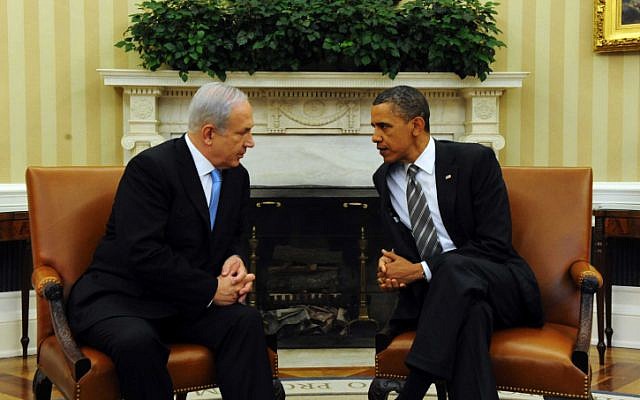T. Belman. There is a lot to disagree with here. He is trying to make the case that its a matter of leadership. The numbers are skewed, he seems to be saying, because two right wing people are in office. I don’t buy it. Just go back to the last two DNC’s. The resolutions passed on the floor by delegates represented an abandonment of Israel. Just the opposite with the RNC’s.
Another reason is that Israel is becoming more rightwing and nationalist and the Democrats are becoming more left wing and globalist.
Survey indicating wider partisan gap than ever on attitudes toward Israel is seen as a reflection of the prime minister’s decision to align with Trump

WASHINGTON — A poll showing that support for Israel becoming an increasingly partisan issue in the US has sparked questions over the significance of the apparent divide, as well as predictable partisan warfare.
The findings by the Pew Research Center show that 79 percent of Republicans “sympathize” more with Israel than the Palestinians, compared to just 27% of Democrats — of whom about an equal percentage supported Palestinians more.
Jewish Democrats repudiated the suggestion that their party was not sufficiently supportive of the Jewish state. “I really resent the Republicans or leaders who want to exploit these kinds of stories,” Ron Klein, who chairs the Jewish Democratic Council of America, told The Times of Israel. “The worst thing anyone who is truly pro-Israel can do is make this a political, partisan issue.”
But experts have pointed out that what the survey appears to point at isn’t withering Democratic support for the Jewish state, but rather a drop in backing for Israel’s right-wing government, led by Prime Minister Benjamin Netanyahu.
“You find demographic trends within the Democratic party that are going in a certain direction,” said Shibley Telhami, a Palestinian-American professor at the University of Maryland who has polled attitudes on the region for decades. “For example, historically, we found that African Americans, Hispanics, women and young people tend to want to see more Israeli compromising. They tend not to agree with the Israeli right wing. Now when we had a more liberal Israeli government, like there was at one point in the late 1990s, there was a lot more sympathy. In part, it’s because you have a right wing government in Israel and that government is seen to have embraced the Republican Party in the US.”

The seminal moment Telhami points to that solidified this perception was during the apex of the 2015 Iran deal showdown, when Netanyahu allied himself with Republicans to unsuccessfully block then-president Barack Obama’s attempts to ease sanctions on Tehran, culminating in his circumventing the White House to address a joint session of Congress excoriating the ongoing negotiations.
“I think it had a lot to do with the prime minister playing a critical role in lobbying the US Congress on the Iran deal,” Telhami said. “A majority of Democrats supported that deal.”
Backing that idea are separate Pew findings that show Democrats’ low opinion of Netanyahu, with only 18% giving him a favorable rating, essentially unchanged from a year earlier.
Michael Koplow, the policy director for the dovish Israel Policy Forum, said the apparent partisan divide can easily shrink again should leaders other than Netanyahu and US President Donald Trump be in power.
“I don’t think any of it is irreversible,” he said in a phone interview. “I think it’s very much a snapshot of the current moment we are in. It’s not a permanent change.”
Most Democrats subscribe to the two-state solution as the key to Middle East peace, a formula that the administrations of both Netanyahu and Trump have notably failed to embrace. A more liberal Israeli government that supports two states could quickly change the survey numbers.
“These are two guys who are not going to be there forever. If you had an Israeli government that took a more positive view toward two states, than you would see Democrats registering more sympathy in the Pew poll, as well,” Koplow added.

Several analysts, most notably former US envoy to Israel Dan Shapiro and the Brookings Institution’s Tamara Cofman Wittes, also cast doubt over the findings, noting that the wording of the question is suspect.
“In the dispute between Israel and the Palestinians, which side do you sympathize with more, Israel or the Palestinians?” Pew asked, giving respondents a binary choice that some say does not reflect the nuances of the conflict.
The survey shows that while the level of sympathy for Israel has been ebbing, sympathy for the Palestinians has not been rising.
“As Democrats say that they have less sympathy for Israel in the Israeli-Palestinian conflict, they’re not saying that they have more sympathy for the Palestinians,” Koplow said. “That suggests to me that Democrats don’t feel any differently about the underlying issue. They don’t feel differently about the Israeli-Palestinian conflict. They don’t think that Israel is wrong and the Palestinians are right. I think it really is a reflection of their frustration with the current Israeli government.”
Nevertheless, he added, the results still reveal an important shift.
“Because they’ve been asking the same question now for four decades, it does measure a change over time, irrespective of whether the question itself is not a great question,” he told The Times of Israel in a phone interview. “Even if you don’t like the question, you have to grapple with the fact the gap has grown significantly since April 2016,” he added. “And the intervening variable there is President Trump’s election.”

As recently as April 2016, Democrats were 43% more likely to sympathize more with Israel, according to Pew.
Telhami notes that as America has become an increasingly more divided country, the association that has been forged between the Netanyahu coalition and the GOP has made Israel an unavoidable part of the equation.
“America is polarized at a level I have never seen before,” said Telhami. “It’s become identity politics. It’s not about liking Israel or disliking Israel.”
“Among Republicans in the poll I did during the election year, Netanyahu was actually the most admired leader for Republicans in the world,” he said. “Because he was seen to be, essentially, one of them.”



Leave a Reply
You must be logged in to post a comment.